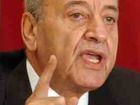A century ago France created Greater Lebanon, the foundation for the modern-day state of Lebanon which is now mired in a deep political and economic crisis.
 Full Story
Full Story
MTV television station announced on Monday that it was banned from covering the parliamentary consultations held at Baabda Presidential Palace to name a new PM for Lebanon.
 Full Story
Full Story
Parliament Speaker Nabih Berri on Monday called for change to the country's confessional political system in the aftermath of the explosion at Beirut's port, blamed on official negligence and corruption.
 Full Story
Full Story
Lebanese prime minister-designate Mustafa Adib vowed Monday to swiftly launch a reformist government and seek international financial assistance after the Beirut blast deepened a political and economic crisis.
 Full Story
Full Story
It was a century ago on Sept. 1, 1920, that a French general, Henri Gouraud, stood on the porch of a Beirut palace surrounded by local politicians and religious leaders and declared the State of Greater Lebanon — the precursor of the modern state of Lebanon.
The current French president, Emmanuel Macron, is visiting Lebanon to mark the occasion, 100 years later. But the mood could not be more somber.
 Full Story
Full Story
Lebanon named its envoy to Germany, Mustafa Adib, as the new premier Monday to steer the country through a deep crisis after the Beirut explosion compounded a sharp economic downturn.
The presidency made the announcement in a televised statement as Adib arrived at the palace in Baabda near Beirut to meet President Michel Aoun and parliament speaker Nabih Berri.
 Full Story
Full Story
The ISG expressed its solidarity with the Lebanese people after the explosion that caused numerous victims and severe damages to residential and commercial infrastructures and sites of cultural and religious heritage in Beirut on 4 August and extends its most heartfelt condolences to the residents of Beirut, the Group said in a joint statement on Sunday.
 Full Story
Full Story
Dozens of Lebanon's main opposition groups and parties on Sunday announced a common position and plan to tackle the country's multiple crises.
 Full Story
Full Story
President Michel Aoun on Sunday called for declaring Lebanon a “civil state,” in an address to the nation marking 100 years since the declaration of Greater Lebanon.
The State of Greater Lebanon was a state declared on 1 September 1920, which became the Lebanese Republic in May 1926, and is the predecessor of modern Lebanon.
 Full Story
Full Story




